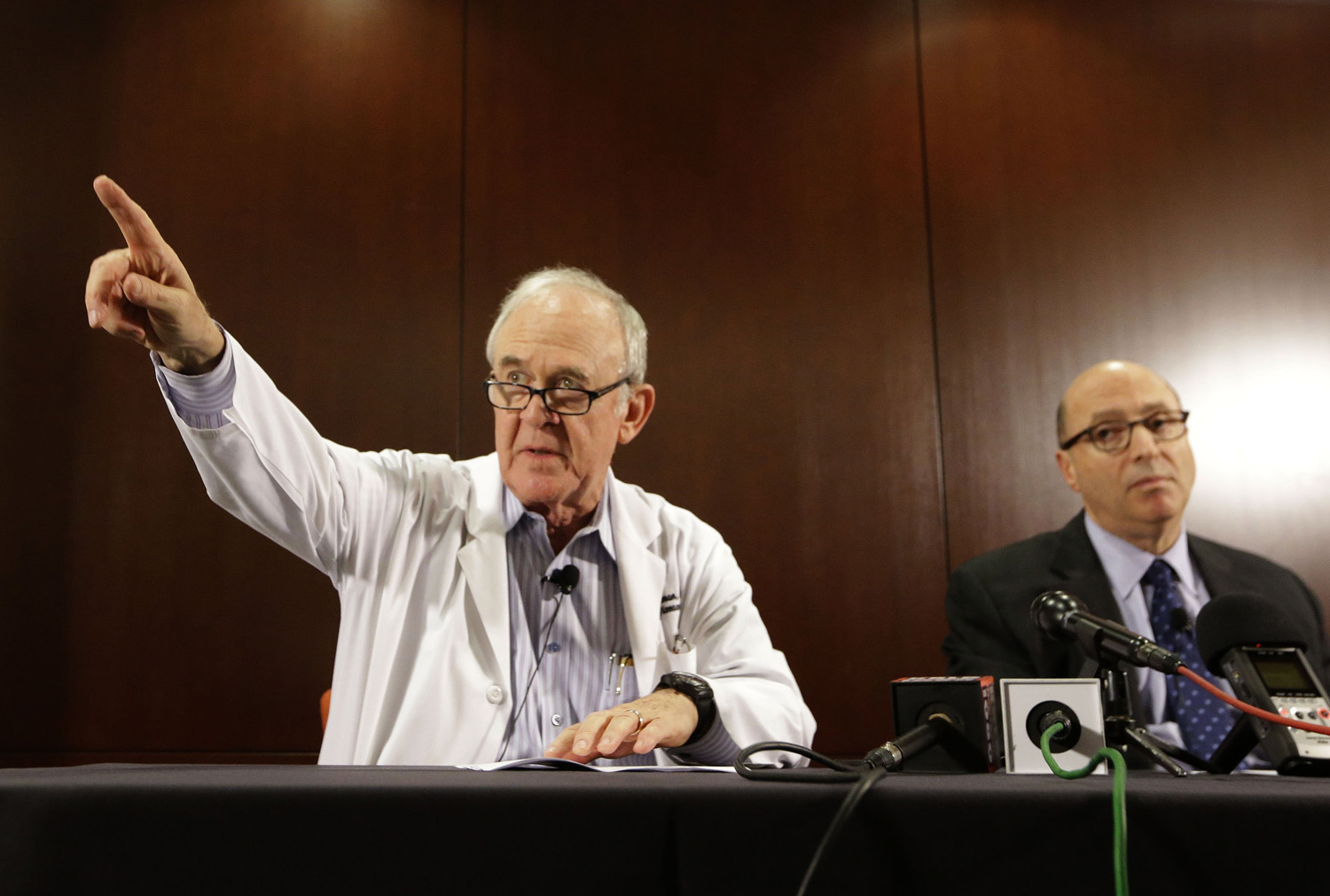
A Dallas hospital patient is battling Ebola, it emerged Tuesday, the first victim of the deadly disease to be diagnosed on American soil. But Texans have resisted the urge to panic at the news, and, contrary to type, have so far been subdued and measured in their public reaction.
Within minutes of the news that a man who had flown from Liberia to Dallas had fallen ill with the deadly virus, a chorus of Texas officials took to the airways to call for calm and insist that this invasion would be defeated. “Take a deep breath,” urged Jay M. Bernhardt, PH. D., director of the University of Texas Center for Health Communication. The former director of the National Center for Health Marketing at the US Centers for Disease Control and Prevention (CDC) suggested on Austin television that the state’s media had a responsibility to be measured and informative in its response — a stance most media outlets appear to be taking, so far. The Dallas Morning News urged readers to take a calm approach to the alarming news: “Time for panic? Absolutely not. This is a time to stay informed and follow the instructions of health professionals so they can ensure that the virus doesn’t spread.”
Even Texas Gov. Rick Perry, usually a ready voice when it comes to expounding on the issue of the day, be it Iranian nukes or border security, took a decidedly low key approach. No immediate statement was forthcoming from the governor’s office, but he did offer a few offhand comments in New York –“we will continue to monitor the situation” — while campaigning for New York Republican gubernatorial candidate Rob Astarino.
But while the call for calm has gone forth, questions are beginning to pile up in Texas — the most serious being why was the patient was originally sent home after initial treatment. The patient first came to Texas Health Presbyterian Hospital on Sept. 26, and was treated, given antibiotics, and discharged, according to numerous local news reports. He then returned on Sunday, Sept. 28. Dallas Mayor Mike Rawlings confirmed Tuesday that the EMS crew that transported the patient back to the hospital after his condition worsened had been placed in quarantine and the ambulance decontaminated. It also was unclear how the patient had travelled to the U.S., what his itinerary had been, and what were his activities upon arrival.
Texans were given some assurances Tuesday. Health officials had been on alert for the possibility of an Ebola outbreak, they were told — after all, the state is home to two significant African immigrant communities in Dallas and Houston, both home to major international airports. Texas Health Presbyterian Hospital, where the patient presented himself, had a run through of Ebola-response activities last week, according to hospital officials.
“We were prepared,” Dr. Edward Goodman, an epidemiologist at Texas Health Presbyterian, said Tuesday in a news conference. “We have had a plan in place for some time now in the event of a patient presenting with possible Ebola. We are well-prepared to deal with this crisis.” The Texas Department of State of Health Services also had been alert to the possible crisis and was certified to do Ebola testing on Aug. 22, David L. Lakey, state health commissioner said Tuesday, enabling a speedy analysis of the patient’s blood.
The news that Ebola had landed in Dallas, while anticipated in an abstract sense by the medical community, was little surprise to some in Dallas’ African immigrant community. Dallas is home to a vibrant African immigrant population, many of them well-educated West Africans who have escaped the poverty of their ancestral homes to build new lives in the U.S, often as healthcare workers or small business owners. The community includes between 5,000 and 10,000 Liberians, according to one Liberian community group, many of whom regularly return to the African country that has been worst hit by the disease. Carolyn Woahloe, head of the Dallas Liberian Nurses Association told KXAS, the Dallas NBC affiliate: “We have people going and coming every day, so like I said, this is shocking, because they take all the necessary precautions over there at the airport and even when they get here.”
But for another established member of the Dallas community, there was a sense of inevitability about this week’s developments. Foday Fofanah has lived in the U.S. for 30 years, and recently returned from his native Sierra Leone after burying his mother. Over the years, he has built up a non-profit, dubbed Sankofa, to help pull his native county out of extreme poverty, and lately he has focused on the impact of Ebola on one of the world’s poorest nations. Sierra Leone has 2,021 cases of the disease and 605 deaths, according to the CDC.
Fofanah told KTVT, the Dallas CBS affiliate, that he wasn’t surprised by the arrival of Ebola in Texas. “There are 5,000 Sierra Leonians in the Dallas area. They know about Ebola,” he said. “I just knew it was bound to happen because people travel every day. It’s a small globe. It was bound to happen.”
More Must-Reads From TIME
- The 100 Most Influential People of 2024
- Coco Gauff Is Playing for Herself Now
- Scenes From Pro-Palestinian Encampments Across U.S. Universities
- 6 Compliments That Land Every Time
- If You're Dating Right Now , You're Brave: Column
- The AI That Could Heal a Divided Internet
- Fallout Is a Brilliant Model for the Future of Video Game Adaptations
- Want Weekly Recs on What to Watch, Read, and More? Sign Up for Worth Your Time
Contact us at letters@time.com